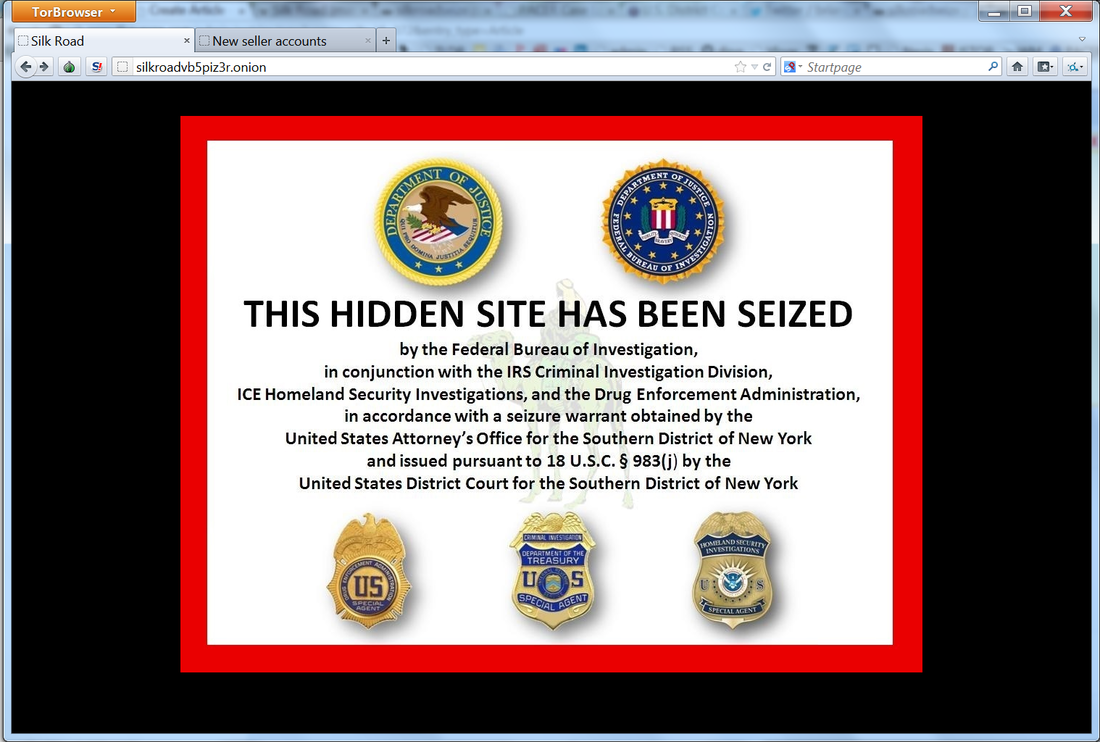
Online anonymity has become an increasingly politicized issue in recent years, especially in regards to the illicit drug trade. In October 2013, the FBI seized the online drug marketplace “Silk Road” and arrested its owner, Ross Ulbricht. Ulbricht, former head of the most prolific online drug market in the world, had operated for years under the pseudonym ‘Dread Pirate Roberts’. According to the FBI, Ulbricht was making over $80 million in commissions from running the site. Four months after his arrest, the former online drug kingpin was charged with conspiracy to traffic narcotics, hack computers, and launder money. He was also charged with “continuing a criminal enterprise”, a charge occasionally referred to as the “kingpin statute” which applies to criminal organizations with six or more members organized by a single leader. These charges are supported by approximately 10 terabytes of data seized from Silk Road servers connecting Ulbricht to the crime. Although he has pleaded not guilty, Ulbricht will face a minimum of 30 years behind bars and a maximum of life in prison if convicted.

Despite the FBI’s capture of ‘Dread Pirate Roberts’ and its subsequent seizure of Silk Road, law enforcement has had very little impact on preventing the flow of online drugs. A website virtually identical to the original Silk Road (referred to as Silk Road 2.0) went live almost immediately after the FBI seizure, operating under the URL “silkroad6ownowfk.onion.” The new website, like its predecessor, operates as an online platform through which drugs can be purchased and sold with impunity. Transactions through the site are completed by exchanging Bitcoin, a highly volatile form of virtual currency. The administrator of the new site is operating under the same pseudonym as Ulbricht. The only discernable difference is that the new site is using PGP encryption, which amusingly stands for “Pretty Good Privacy.”
In addition to the Silk Road brand, there are also a wide variety of other online black markets through which drug transactions can take place. The internet site “Utopia” was thought to be one of the potential successors, but was shut down in a police sting only a few days after it was launched. During the undercover operation, investigators found that they were able to purchase several thousand ecstasy pills in addition to a variety of illegal weapons – all while remaining completely anonymous. Five men were arrested in Germany and the Netherlands in connection with the sting. The website ‘Pandora’ also offers cannabis, steroids, ecstasy, benzos and opioids, amongst other drugs.
‘Sheep Marketplace’ was yet another website hailed as the new alternative to Silk Road, until its administrators announced that the site had been robbed of 5,400 Bitcoins worth $6 million. The site’s administrators claimed that one of its vendors “EBOOK101” had exploited a bug in the system and was responsible for the theft. Nonetheless, many believe that this was an elaborate scam designed by the site’s creators. Later on, Sheep Marketplace users posted on internet site Reddit that 39,918 BTC (worth $40 million) had vanished without a trace.

Despite the obvious problems associated with these websites, however, they remain the most effective means by which to sell and purchase illegal drugs without being caught by law enforcement. These online black markets are located in the proverbial ‘dark web,’ an area of the internet that cannot be accessed by standard search engines. The dark web can be accessed via ‘Tor Browser’, also known as “the onion router.” An onion router is essentially an internet site that takes the source data packet (e.g. a webpage access request) and transmits it through a random multitude of encrypted relays, a process which prevents observers such as the FBI from tracking where your data came from and where it’s going next. Torproject.org describes the process as “similar to using a twisty, hard-to-follow route in order to throw off somebody who is tailing you — and then periodically erasing your footprints.”
The funny part is that Tor was originally designed by the very same government that is seeking to prevent the flow of online drugs onto its streets. According to Naval Research Laboratory mathematician Paul Sylversen, he and two colleagues designed Tor for the United States as a military application. What is also amusing is that the US State Departments remains one of the largest sponsors of the TOR Project.

Nevertheless, while Tor undoubtedly provides a substantial level of anonymity, it is by no means a fool-proof-system. The effectiveness of Tor has been repeatedly compromised by human error. Ross Ulbricht, for example, was caught by authorities due to a series of sloppy mistakes including the use of his real name on internet forums. A 22-year-old Dutch man, Cornelius Jan Slomp, was arrested in August 2013 for online drug trafficking while operating under the pseudonym ‘SuperTrips’. Jan Slomp was charged with distributing worldwide approximately “104 kilograms of powder 3,4-methylenedioxy-N-methylamphetamine, also known as MDMA; 566,000 ecstasy pills containing MDMA; four kilograms of cocaine; three kilograms of Benzodiazepine; and substantial quantities of amphetamine, lysergic acid diethylamide (LSD), and marijuana, in addition to allowing substantial quantities of methamphetamine, ketamine, and Xanax.” Although the accused had used Tor to complete his online transactions, investigators were able to identify his fingerprints on several packages that were found to contain controlled substances.
Despite these successful investigations, however, it would be naïve to think that the prosecution of one or two high-profile traffickers will do anything to actually stop the online drug trade. The most successful online traffickers are intelligent criminals with substantial knowledge on one of the most encrypted and untraceable networks on the planet. Even if substantial resources are expended to capture these individuals, new traffickers will always step up to the plate so long as the industry remains lucrative. In an effort to combat this reality, many are calling for the relaxation of the harsh policies that make online drug trafficking so absurdly profitable. Until the political landscape pivots in this direction, however, it is unlikely that current efforts will be enough to cripple the online drug trade.




